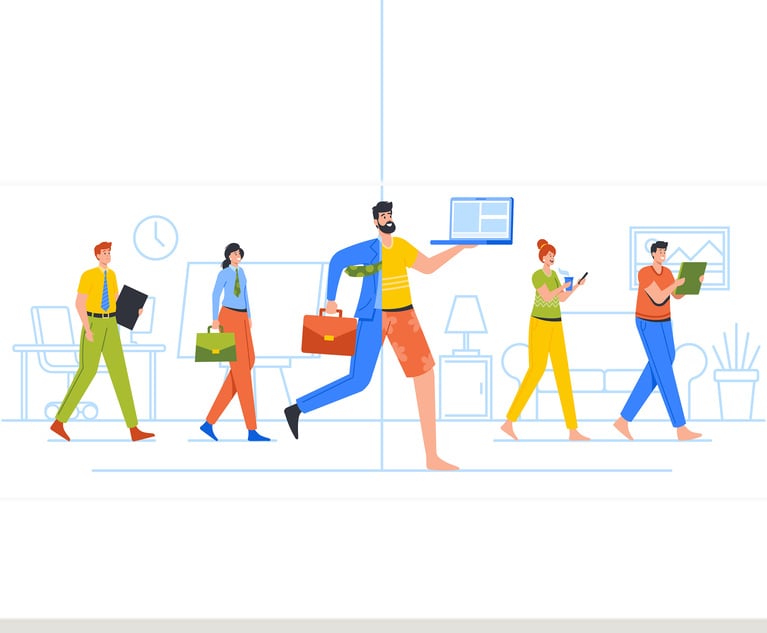Smart Ways to Enhance Client Relationships Via Technology
Like other businesses, relationships are at the core of the legal profession. Clients expect attorneys to be able to draft documents, write briefs, argue motions and manage legal transactions.
December 05, 2018 at 12:23 PM
5 minute read
 Kelly Dobbs Bunting, left, and Adam Roseman, right, of Greenberg Traurig.
Kelly Dobbs Bunting, left, and Adam Roseman, right, of Greenberg Traurig.
Like other businesses, relationships are at the core of the legal profession. Clients expect attorneys to be able to draft documents, write briefs, argue motions and manage legal transactions. While these skills are necessary, today's legal profession also requires attorneys (especially more junior attorneys) to forge lasting relationships with clients. In other words, clients are people too and it's important to build and sustain both professional and personal relationships with them even when you are not representing them in an active litigation or transaction.
Ideally, attorneys would find time to meet face-to-face with clients regularly but work, family and scheduling conflicts often prevent repeated face-to-face interaction. As such, attorneys should consider turning to technology to fill some of the gap. Used strategically, technology can amplify your business development potential and show your clients that you are thinking about them and understand their business needs. A word to the wise though: be strategic but don't be creepy! Figure out if a client wants to communicate—or perhaps wants to be left alone—and how the client wants to communicate.
Let's review a few ways you can leverage technology to enhance your client relationships.
Email and Outlook reminders—Use email or Outlook calendar entries to remind you to call a client or send them a short email, especially clients with whom you have not communicated in a while. This is especially important when you are not actively representing the client in litigation or a transaction. Clients get hundreds of emails a day; an email that simply says “hello” or “hope all is well” and does not ask for anything is usually welcome and keeps your name in front of them. Indeed, these kinds of emails often remind a client that they have something on their desk that they need your help with.
Google alerts—Clients expect their attorneys to know their business. Google alerts can make that happen. Google alerts allow you to receive notifications regarding information or articles about a client. For example, a Google alert will send you links to articles about your client's merger or acquisition. In turn, you can use this information to send the client a quick email or make a short call to congratulate them. Further, staying up-to-date on the client and its business will make you appear more like a partner and trusted adviser rather than merely a service provider who handles its legal work. Asking questions like “Will the company's recent sale of its insurance division impact how we want to litigate this case?” shows the client you understand its business and that litigation and transactions are necessarily interconnected with, affect and impact other aspects of its business.
Videoconferencing—Conference calls are expedient, but sometimes a videoconference is more personal and perhaps even necessary. Face-to-face interaction with a client, even if it is by videoconference or Skype, can help you better understand the client and establish a more meaningful connection. There is no substitute for seeing a client's facial expression or reaction to a litigation strategy or a smile when you tell them that a deal officially closed. You can't get that immediate feedback on a conference call!
Thoughtful video notes—Many attorneys send clients articles relevant to their business, but sending videos can be even more meaningful, not to mention a welcome break for the client from reading emails, articles, and documents. Sending a news video that relates to the client's business is a great way to show the client you are thinking about them and their problems and issues. Extra credit for sending a client a video that establishes or strengthens a personal connection. For example, if you and the client both like soccer, you could send them a video of an incredible goal that happened in the match the evening before. Be selective; don't force these kinds of personal connections, but if they exist, utilize them and don't be afraid to foster that connection. Again, clients are people just like you!
In sum, clients, like most people, like to work with people they have a connection with and who understand the problems that the client or its industry faces. In-person interaction is ideal if you can do it, but it's not always possible, so attorneys should use technology to fill the void. Do not discount the value of calling or emailing a client to say “hello” or sending them a video about their business or a mutual interest. These connections are invaluable as they will help you forge connections with your clients that go deeper than just the day-to-day legal matters on which you work.
Adam Roseman is a labor and employment associate and Kelly Dobbs Bunting is a labor and employment shareholder at the Philadelphia office of Greenberg Traurig.
This content has been archived. It is available through our partners, LexisNexis® and Bloomberg Law.
To view this content, please continue to their sites.
Not a Lexis Subscriber?
Subscribe Now
Not a Bloomberg Law Subscriber?
Subscribe Now
NOT FOR REPRINT
© 2025 ALM Global, LLC, All Rights Reserved. Request academic re-use from www.copyright.com. All other uses, submit a request to [email protected]. For more information visit Asset & Logo Licensing.
You Might Like
View All
Whether to Choose State or Federal Court in a Case Involving a Franchise?
5 minute read
Trump RTO Mandates Won’t Disrupt Big Law Policies—But Client Expectations Might
6 minute read
Kirkland Lands in Phila., but Rate Pressure May Limit the High-Flying Firm's Growth Prospects
5 minute readTrending Stories
- 1Who Are the Judges Assigned to Challenges to Trump’s Birthright Citizenship Order?
- 2Litigators of the Week: A Directed Verdict Win for Cisco in a West Texas Patent Case
- 3Litigator of the Week Runners-Up and Shout-Outs
- 4Womble Bond Becomes First Firm in UK to Roll Out AI Tool Firmwide
- 5Will a Market Dominated by Small- to Mid-Cap Deals Give Rise to a Dark Horse US Firm in China?
Who Got The Work
J. Brugh Lower of Gibbons has entered an appearance for industrial equipment supplier Devco Corporation in a pending trademark infringement lawsuit. The suit, accusing the defendant of selling knock-off Graco products, was filed Dec. 18 in New Jersey District Court by Rivkin Radler on behalf of Graco Inc. and Graco Minnesota. The case, assigned to U.S. District Judge Zahid N. Quraishi, is 3:24-cv-11294, Graco Inc. et al v. Devco Corporation.
Who Got The Work
Rebecca Maller-Stein and Kent A. Yalowitz of Arnold & Porter Kaye Scholer have entered their appearances for Hanaco Venture Capital and its executives, Lior Prosor and David Frankel, in a pending securities lawsuit. The action, filed on Dec. 24 in New York Southern District Court by Zell, Aron & Co. on behalf of Goldeneye Advisors, accuses the defendants of negligently and fraudulently managing the plaintiff's $1 million investment. The case, assigned to U.S. District Judge Vernon S. Broderick, is 1:24-cv-09918, Goldeneye Advisors, LLC v. Hanaco Venture Capital, Ltd. et al.
Who Got The Work
Attorneys from A&O Shearman has stepped in as defense counsel for Toronto-Dominion Bank and other defendants in a pending securities class action. The suit, filed Dec. 11 in New York Southern District Court by Bleichmar Fonti & Auld, accuses the defendants of concealing the bank's 'pervasive' deficiencies in regards to its compliance with the Bank Secrecy Act and the quality of its anti-money laundering controls. The case, assigned to U.S. District Judge Arun Subramanian, is 1:24-cv-09445, Gonzalez v. The Toronto-Dominion Bank et al.
Who Got The Work
Crown Castle International, a Pennsylvania company providing shared communications infrastructure, has turned to Luke D. Wolf of Gordon Rees Scully Mansukhani to fend off a pending breach-of-contract lawsuit. The court action, filed Nov. 25 in Michigan Eastern District Court by Hooper Hathaway PC on behalf of The Town Residences LLC, accuses Crown Castle of failing to transfer approximately $30,000 in utility payments from T-Mobile in breach of a roof-top lease and assignment agreement. The case, assigned to U.S. District Judge Susan K. Declercq, is 2:24-cv-13131, The Town Residences LLC v. T-Mobile US, Inc. et al.
Who Got The Work
Wilfred P. Coronato and Daniel M. Schwartz of McCarter & English have stepped in as defense counsel to Electrolux Home Products Inc. in a pending product liability lawsuit. The court action, filed Nov. 26 in New York Eastern District Court by Poulos Lopiccolo PC and Nagel Rice LLP on behalf of David Stern, alleges that the defendant's refrigerators’ drawers and shelving repeatedly break and fall apart within months after purchase. The case, assigned to U.S. District Judge Joan M. Azrack, is 2:24-cv-08204, Stern v. Electrolux Home Products, Inc.
Featured Firms
Law Offices of Gary Martin Hays & Associates, P.C.
(470) 294-1674
Law Offices of Mark E. Salomone
(857) 444-6468
Smith & Hassler
(713) 739-1250






